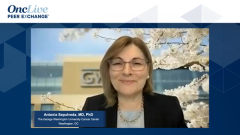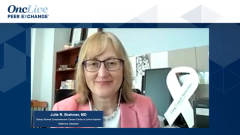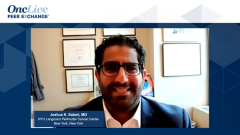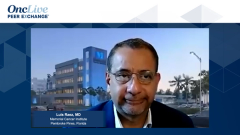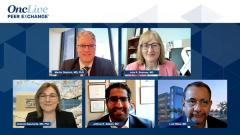
NSCLC: Biomarker Testing Strategies and Turnaround Time
Focused discussion on tissue testing and the effect of turnaround time on NSCLC treatment and molecular testing strategies.
Episodes in this series

Transcript:
Martin Dietrich, MD, PhD: Dr Brahmer and Dr Raez, I would like to hear your experiences with turnaround time and the strategies. Dr Sabari already mentioned 3 to 4 weeks for tissue in his experience. What are you doing about it? What suggestions are there? Maybe you could even comment on some reflex protocols now that earlier-line therapies are molecularly guided as well.
Julie R. Brahmer, MD, MSc: Welcome to my headache. This is a constant problem – how to grease the wheels and make things go more quickly for our patients. To automatically have these reflexively ordered, there’s a lot of issues with that, particularly if a pathologist has some issues, or at least our department has some issues with a pathologist ordering it just in the fact that that person is not the treating physician. There are a lot of different things that go into this. [As far as] turnaround time, ours is 2 to 4 if it’s done in-house. If it’s sent out, we’re at the mercy of whoever is sending the tissue out, not exactly the company that’s running it. Certain companies do work with our department better than others in order to get the tissue out to another company. That’s why, at least in the metastatic setting, I do use liquid biopsy, where it’s done outside of the institution, goes directly to the company, and it’s a 5- to 10-business-day turnaround. This is the tough part. And then if you don’t have enough tissue, that starts the clock all over again for our patients.
Martin Dietrich, MD, PhD: Dr Raez, how does it work at your institution?
Luis Raez, MD: We just published in Clinical Lung Cancer that in the last 5 years, we do tissue and liquid in everybody. And as Joshua said, 7 to 9 days liquid and 28 days tissue because we are a referral center for lung cancer. When I order a tissue NGS in a hospital and nobody knows who I am, it may take 1 or 2 weeks for that technician or the hospital to send the sample to our industry partner. That’s why it’s very painful because the shipping time is horrible. In our own statistics, 70% of the time, after 8 days, we can make a decision on the patient about what is the treatment for them. That is very important because in real life in the United States, what we’re doing now is they are giving empirical chemotherapy while you wait 3 or 4 weeks because a lot of patients don’t want to wait. People say, “Let’s give a cycle of carboplatin-pemetrexed,” or try immunotherapy, but that’s not really precision medicine. We are doing something empirically and that empirical chemotherapy is terrible because it ruins our chances to put the patient in clinical trials because you give the carboplatin-pemetrexed, and 3 weeks later, you learn that it’s EGFR. And now when you want to enroll in an EGFR trial, they tell you, “We cannot enroll people who had chemotherapy before.” That’s why I have always been against doing empirical chemotherapy and at least in the 70% of the patients, I get a result in 9 days, so at least these patients will have the right treatment without giving empirical chemotherapy. So that is the way that works in our institution.
Martin Dietrich, MD, PhD: Dr Brahmer, how do you manage this in your clinic when you have symptomatic patients? How do you manage the uncertainty of tissues ? How do you communicate it? And how would you recommend for our viewers to approach this clinically? Symptomatic lung cancer is unfortunately an all-too-common scenario.
Julie R. Brahmer, MD, MSc: If I’m worried that their disease is rapidly progressing, I’m going to start chemotherapy. But if patients have been stable and their symptoms have been unchanged for several weeks and they just would really like to start therapy, I try to pump the brakes and try to get them to understand that we need to wait to start therapy until we have all the information, dot the i’s, and cross the t’s, in order to start them on the right one. But I really think symptoms and pace of their disease [are important factors]. If they’re requiring oxygen and this is brand new, then I’m probably not going to wait around. Or if they have obviously rapidly progressing disease, and they say, “Last week I never had this lymph node, and now I can feel it,” then I’m going to be hesitant to wait much longer, and I want to try to start as quickly as possible. And obviously, in patients who are hospitalized because of their symptoms, then for the most part we’re stuck starting chemotherapy.
Martin Dietrich, MD, PhD: What is your preferred regimen for those patients? Can you give us a little bit of guidance there depending on the histology? Is there a preference?
Julie R. Brahmer, MD, MSc: Obviously, pemetrexed carboplatin is so easy for most patients to tolerate who have non–squamous cell histology. For squamous histology, I’m on the fence. I’ve been around as long as paclitaxel has been, so I use a lot of paclitaxel-carboplatin. I don’t use much gemcitabine-carboplatin anymore, unless the patient specifically requests that due to adverse effects that we need to avoid. Anyone else? Any thoughts?
Luis Raez, MD: You can use carboplatin, not paclitaxel. In Florida, we have a lot of elderly, so sometimes we have to rule out. We have 80-year-olds, 85-year-olds, 90-year-olds. We use a lot of weekly chemotherapy because it makes sense and it makes things easier for them.
Martin Dietrich, MD, PhD: Very good. I cannot overstate the importance here. I agree, those are solutions that are only of temporary nature.
Transcript is AI-generated and edited for clarity and readability.


